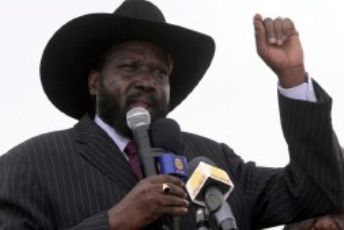South Sudan president says secession from Sudan “an irreversible reality”
February 18, 2013 (JUBA) – South Sudanese president Salva Kiir Mayardit has described secession from neighbouring Sudan as an “irreversible reality” and that the new nation will never move away from being a neighbour of Sudan, according to a senior government official.

The presidential aide, speaking on condition of anonymity, said the president made the remarks at a high-level meeting with Mongolia’s president, Tsakhiagiin Elbegdorj, during which he is reported to have called on the international community to persuade Sudan to resolve the various post-partition disputes.
“We have done everything possible in our capacity as government so that we could resolve any dispute with the Republic of Sudan through peaceful dialogue. We made a lot of painful decisions, some of which our people did not like. The reason for making all decisions was to avoid being the source of conflict. It is our commitment not to return the citizens of our two countries to war because we know war is not in the best interest of the citizens. They (the citizens from both Sudan and South Sudan) need peace and stability but the other side did not show similar interest”, Kiir told his visiting guest, who is in South Sudan to visit his country’s peacekeeping troops.
“IMPOSSIBLE DEMANDS”
Relations between South Sudan and its northern neighbour remains tense, although last September the two heads of state signed a number of deals aimed at breaking the deadlock over post secession disputes.
However, both countries continue to face challenges on how to implement the deals, with both governments blaming each other for the agreement’s slow implementation.
Juba accuses Sudan of making “impossible demands” on border security issues, including disarming their former comrades fighting the Sudanese government in Blue Nile and South Kordofan.
The SPLM government in Juba denies backing the SPLM-North rebels and sees Sudan’s emands part of ongoing attempts to deny South Sudan use of its territory and infrastructure to transport its crude oil to international markets via Port Sudan on the Red Sea coast.
South Sudan’s information minister, Barnaba Marial Benjamin, agreed with the president’s statements, saying there were some people fighting the government because they still think they are part of Sudan.
“The president is right in all he said […] We have some people today who have taken up arms to fight and kill innocent people just because they accept to be used by Sudan. They do not see that [the] people they are killing are their own people. They are still affected by the hangover (from the two-decade civil war) and some myths that make them feel they are still part of Sudan”, Marial said on Monday.
PROXY WAR
He cited the conflict in Jonglei, accusing Sudan of using Murle militia chief David Yau Yau to fight a proxy war.
The armed insurgency in South Sudan’s most populous state has threatened to destabilise the east of the new nation, with fighters loyal to Yau Yau accused of cattle raiding, abductions and civilian attacks.
Yau Yau first rebelled against South Sudan’s ruling Sudan People’s Liberation Movement (SPLM) in May 2010 after losing his bid to join the Jonglei State Assembly in parliamentary elections.
After accepting an amnesty offered by Kiir in 2011, Yau Yau re-joined the SPLM government, allegedly in exchange for a house, cars and cash. He was also made a general in the South Sudanese army (SPLA) as part of the deal.
However, in April last year Yau Yau defected to Khartoum in order to launch another rebellion in Jonglei’s Pibor county.
“What is Yau Yau fighting for? What can he say is the reason of killing innocent civilians in Jonglei? The government of the Republic of South Sudan as a sovereign state has a responsibility to protect its citizens from anything because they are citizens of this country,” Marial said.
“He came and was promoted to the rank of general, while in fact he was just a civilian. He was put in a hotel, given a vehicle and some money, but what did he do? He quietly decided to run to Khartoum and came back to destabilise the area”, he added.
Marial said the Mongolian president had come to see where troops from his country serving for the United Nations Mission in South Sudan (UNMISS) have been deployed and made a visit to troops on the ground in Bentiu and Rumbek.
“These are the areas where troops have been deployed. He (the Mongolian president) also had good bilateral discussions with the president. They discussed the role of the international community in helping the two countries resolve the dispute”, Marial said at the briefing with journalists.
(ST)
